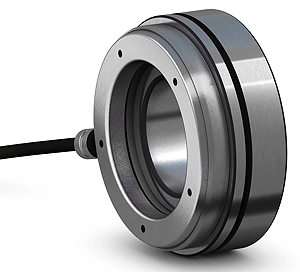The Mesbu (motor encoder sensor bearing unit) device is claimed to be the first that integrates a bearing with a magnetic sensor technology to deliver an incremental encoder-like output. It produces accurate signals (with a quality and accuracy level certified by SKF) for real-time speed and direction measurement on asynchronous motors.
“As the electric motor industry gears up to asynchronous electric control, it’s imperative that the technology that supports these changes,” explains Alberto Carlevaris, manager of SKF’s engine and ePowertrain business. “This means offering more compact products that are attuned to the specific requirements of both increased performance and reduction in energy consumption, while enabling greater power density and simpler assembly for electric motor manufacturers.”
The bearing-encoders are 6.2mm wider than a conventional deep-groove ball-bearing, and provide a signal resolution of 32–80 digital pulses per revolution. They are available for shaft diameters from 15–45mm and can be mounted in either bearing position in a motor.

SKF says that its integrated bearing-encoder will cut the size and weight of EV motors
The Mesbu’s compact design and enhanced performance will cut both the weight and size of EV motors, thus delivering cost savings for vehicle manufacturers, SKF suggests. They will also result in a more streamlined assembly process, it adds.
Options for the bearing-encoder include a flange sensor-body, which can be integrated as part of the motor casing, and an eDrive ball bearing for low-friction torque when driving at high speeds.

